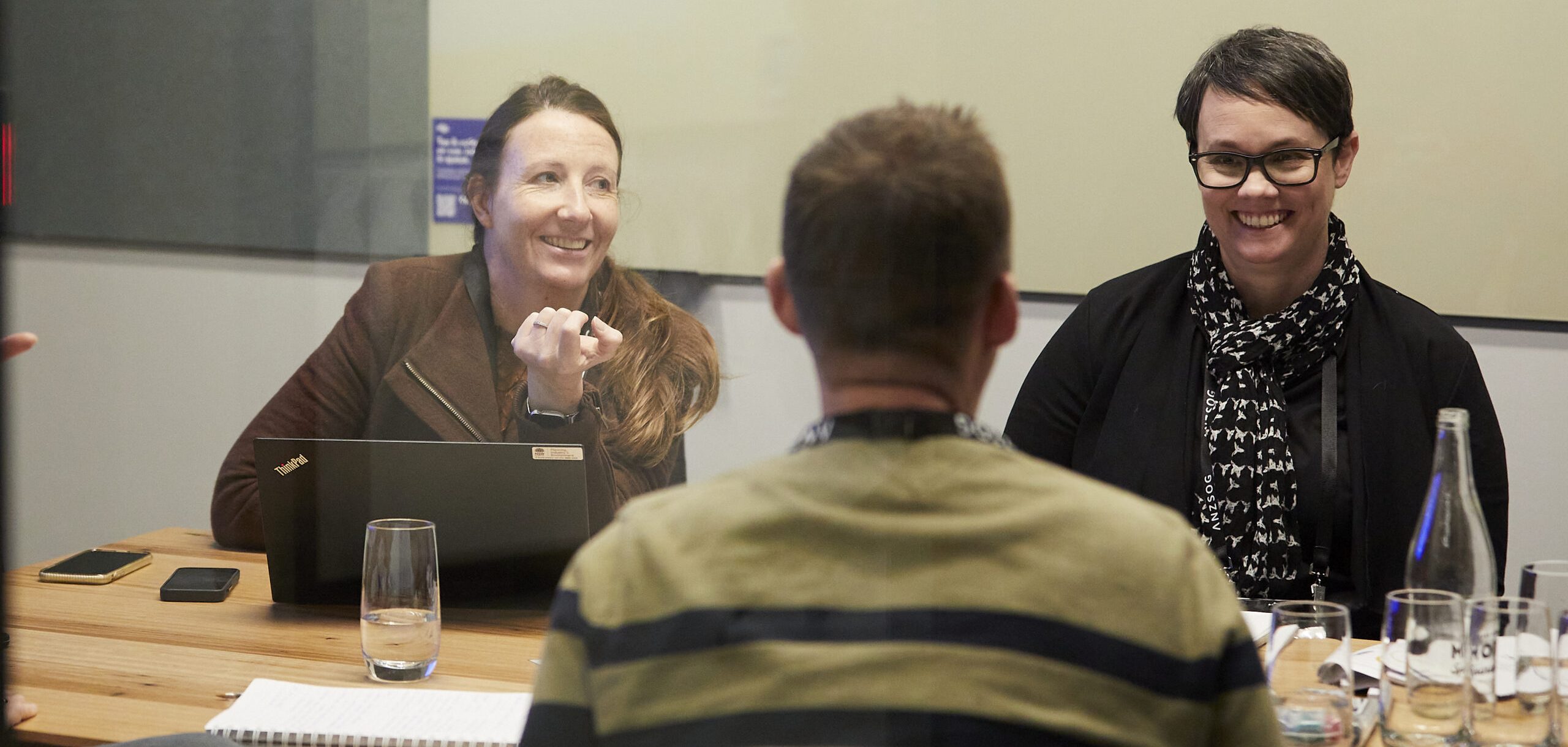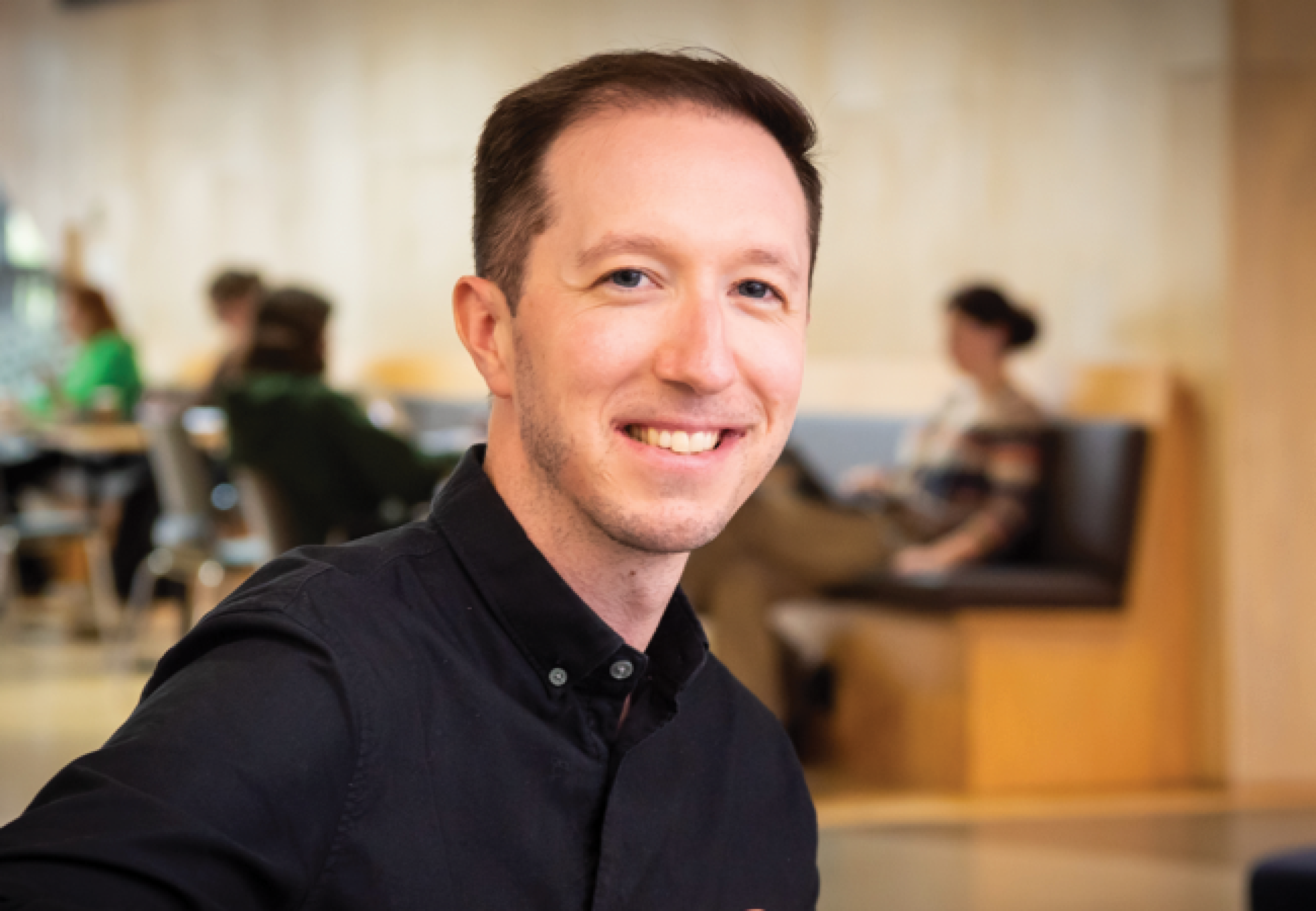Understanding management in the public sector: a conversation with EMPA subject leaders Ben Walker and Todd Bridgman
7 August 2024
● News and media
ANZSOG’s Executive Master of Public Administration (EMPA) brings together a cohort of engaged and passionate public service leaders and future leaders to learn from world-leading academics.
One of the EMPA’s subjects is Managing Public Sector Organisations (MPSO), which is taught by Victoria University of Wellington’s (VuW) Professor Todd Bridgman, Head of VUW’s School of Management and Dr Ben Walker, Senior Lecturer in Organisational Behaviour.
MPSO examines the internal and external factors that influence the successful management of public sector organisations and helps students to better understand and critique their own style and approach to managing others.
The pair expose EMPA students to new understandings of established management theory and the psychology of workplaces and provide a space for self-reflection about what makes a good public sector manager.
Ben (left in photos below) and Todd spoke to ANZSOG about how they approach MPSO, what it’s like teaching a cohort of public sector leaders, why academics and theorists don’t have all the answers and what they want students to take away from the subject.


I want to ask you both as a starting point, what sparked your interest in management and the psychology of workplaces and organisations?
TB: Management studies is a very open field and eclectic field, it’s not a long-established discipline like political science, sociology, psychology. Management studies draws on those established academic disciplines with a particular focus on work and organisation or management, as we call it.
This means there’s a lot of innovation and creativity in the field of management. You can really bring a range of different perspectives and ideas from other disciplines, it’s non-judgmental in that respect. I’ve found my way into what is called a critical approach to management and organisation – it’s critical of what we call mainstream thinking. It’s a niche area, which provides some really novel perspectives on management, and there’s a worldwide community of critical management scholars that I’ve been able to connect with.
BW: I did management and accounting as an undergraduate, which are two very different topics. But the management stuff was always more interesting to me, because I find people are quite fascinating. On the one hand, they’re so complex, and each individual is very unique and has all the idiosyncrasies. But the other thing I love too is trying to discover the sort of universal things in human nature and human behaviour, like universal tendencies or reactions or preferences. Like what are some of the universal problems or puzzles, or tendencies or patterns of behaviour that we see that are kind of widespread and pervasive, either for good or for bad?
What are some of the things that public servants need to understand about individual motivation and psychology, if they’re going to be able to manage teams or organisations effectively?
BW: The very first topic in MPSO is about motivation and understanding both historically significant theories of motivation and also more contemporary research. We touch on the different reasons why people go to work, the different reasons why people do work, the different kinds of mental relationships people can have with their work.
One of the things we really emphasise in that topic is that there’s sort of a bright side to motivation, which is what people typically think of when they think of motivation. It is about factors like passion, interest and autonomy and all the good things that can be the key levers you can pull to make someone more motivated. But we talk about motivation having a dark side as well, and how people can be motivated by negative psychological forces, like anxiety or insecurity or wanting to live up to others’ expectations of them. We cover how those things can produce high performance, but they can also be a high personal cost and cost to colleagues as well.
What insights does MPSO offer to public sector leaders? Are there any differences in management in the public sector employees compared to the private sector?
TB: The context organisations operate in – such as whether they are in the public or private sector – should influence how these organisations are managed. I don’t claim to know all the answers about how best to manage in either sector to be honest.
That means my role is to provide students with theoretical perspectives on management, as well as some knowledge of current research and practice. The insights that MPSO offers are generated by the students themselves. They apply the theories and the research to their own experience of managing people, and of being managed.
It’s that critical engagement between theory and practice that hopefully generates real genuine practical insights – insights that students arrive at themselves, not ones that we’re prescribing for them.
What we’re also trying to do is to offer a critical engagement with theory, rather than just taking theory as given and asking students to apply it to their experience. So, we’re asking students to think about how well the theory might explain their practical experience, but also what it misses, or doesn’t explain well. This is important to do, especially in the field of management students, because a theory that is applied within a particular context, or organisation, can be quite damaging if there’s no critical engagement with the theory.
Much management theory comes out of the experience of large corporations in the United States. For example, in the field of change management, an influential theory is John Kotter’s Eight Steps model for managing organisational change, which is a really appealing prescription about how we should go about changing organisations. We need to remember that this theory might be a good fit with large corporations in the US, but the context in public sector organisations is very different.
My research focus is exploring the origins of well-known theories of management, and how they are taught to students. Many of these theories that appear in textbooks, and that have been highly influential in practice, such as Lewin’s three steps to changing an organisation; theories of leadership, like transformational leadership, or even theories like Maslow’s hierarchy of needs, bear little resemblance to what their founders originally wrote.
On MPSO we take a deeper look at these theories and their origins. By critically engaging with these theories, we can generate new and different insights into managing people at work.
BW: Students bring the experience and the insights, and all of that nitty-gritty detail and knowledge about the public sector, their organisation, how things tend to work. What we bring is theory and research and evidence. And we merge those two things together through the classes. That works well, because it gives really clear ‘expert’ roles to both the teacher and the learners, that are quite distinct from one another.
One thing I have noticed through teaching MPSO for the first time last year, is that in the public sector you have people who are motivated by quite different factors when it comes to the work – that idea of contributing to community and upholding and improving the social fabric. That could make management more challenging in some ways, when people care deeply about their jobs, they can have very firm ideas about what’s the best way to go about doing them.
What concerns and issues are were raised by people in the MPSO program about the public sector?
BW: One thing that came through strongly was the risk aversion, the bureaucracy and the size of the structures people work in, and how that intensifies those issues.
But the surprising issue to me was about communication, particularly the problem of having too much of it in their organisations.
Communication is one of our four modules, and initially that conversation with the students about over-communication or excessive communication was kind of light, with people blowing off steam by talking about all the annoying things that people do – ‘reply all’ to emails or cc’ing in people when they don’t have to. When we dove into it more with the students, we actually saw that underpinning that were some of the things we were talking about around a lack of trust in many organisations and a risk aversion, and these quite deep-seated organisational issues.
We ended up talking about some quite meaty issues that are fundamental to the culture of their organisations. I think that the grind of day-to-day work means students didn’t have too many opportunities to reflect on that issue and how they could correct it, even though for many of them it was something that was quite significantly affecting their work lives.
TB: A lot of them were to do with the bureaucracy that happens in large organisations, but one that surprised me was an issue we discussed in relation to Stanley Milgram’s famous obedience experiments, which look at why supposedly good people followed orders in a way that generated the Holocaust and millions of lives lost.
I used a case, a recent event here in Aotearoa New Zealand where people in the Immigration New Zealand office could see that migrant exploitation was going to occur because of the processes that they were being asked to apply to visa applications. Yet it went on much longer than I would have thought before the whistle was blown.
I thought this would be a very unusual case – but many students on the course were aware of other cases or had experienced these dynamics themselves. This isn’t good, either for employees or for the organisations they’re working for. I’m really trying to encourage employees to have a stronger voice, and for leaders and managers to understand the need to listen to employee concerns.
As Aotearoa New Zealand academics in the EMPA program, what do you feel that Australian public servants can learn from the New Zealand experience and vice versa?
BW: What I found was really interesting last year is that distinction between state-level government and federal government in Australia. We don’t have that here. Because that creates a whole other layer in that hierarchy of government, and I think our New Zealand students can learn quite a lot from our Australian students about how to navigate that potentially very complex hierarchy and multiple levels of government.
And then going the other way, the big thing, and it’s a massive talking point at the moment with our relatively new government, is the role of the Treaty of Waitangi.
I got a sense from Australian students that some of those treaties are now being developed with Indigenous Peoples at the state level, which I think is a positive development. But I think our Australian students could learn from us here in Aotearoa New Zealand, how we have that integrated the Treaty at the federal level. I think there’s opportunities to learn about what it looks like to not just pay it lip service, but actually enact it and incorporate it into the design of policy.
TB: Aotearoa New Zealand collectively may be a little further down that road in terms of its relationship with its Indigenous people. Not just in the way of respecting connection to the land, but actually really trying to engage in Indigenous ways of organising and managing and drawing from that as a source of better ways of managing.
Most management ideas come from such a narrow part of the world, the USA and the United Kingdom, originating in a narrow time, about 100 years ago. We have to look in different places and at different times for inspiration about how we could do management differently and better, so Indigenous peoples can be a source of new ideas about management.
BW: My family has Māori heritage, which slipped away through the generations until my dad became interested in it when he was in his 20s and became very involved in the Māori world. He sent me and my sister to Kōhanga Reo, which is a Māori language immersion school. So, my earliest childhood experiences are very much of being in that world.
One thing it does make me focus on is the need to include as many people in the conversations as possible – to not let the few loudest voices dominate the conversation, and to hear from the voices that are potentially not heard that often or not given the weight that they deserve.
It also makes me realise that there are many ways of doing management and being a good manager beyond those that appear in Harvard Business Review. In fact, some of the things that come out in an outlet like HBR as ‘new thinking’ are things that are just taken for granted in Indigenous cultures or at least Māori culture. There’s been a lot of talk recently about the whole turn to sustainability and corporate social responsibility. I see this as a sort of a Western rediscovering of quite ancient ideals for many cultures around the world, including Indigenous ones.
What things do you want students to do differently as a result of doing MPSO?
BW: I think the biggest thing, and this is embedded into the whole course, is trying to get them to understand their personal theory of management.
That can involve making them first realise that they have one, because everyone has been managed, everyone has implicitly learnt or adopted certain assumptions and values about what it is to be a good manager. We want students to recognise their personal theory of management and then to start thinking more critically about: what does that theory look like? what are sort of the strong points? what are the areas for development? what are the sort of the blind spots or things they’ve never really paid much attention to?
One of the things I hope people come out of MPSO with is an awareness that there are so many bad bosses out there, and the massive impact they can have on people’s lives and wellbeing.
We want them doing everything they can to be a manager who actually makes a positive difference in people’s lives. That’s not an easy thing to do. It’s going to look different for different employees and it’s going to look different in different contexts.
But making the effort to be a good boss is totally worth it and it’s not necessarily that difficult. A lot of it is quite basic stuff that just requires a little bit of self-reflection and self-awareness. And given that all of the ANSZOG students are working in the public sector, you know, ultimately that will trickle down and affect societies and communities in a positive way.
TB: Be humble. Reflect on their own practice as managers. Have much more open conversation with the people you manage, rather than just get stuck in these stereotypes of what managers are and what they’re expected to do.
It’s easy to underestimate the ability of people who we’re managing. Maybe it’s a defensive mechanism, to think, as managers, that we know best, and we’ve got the best access to information. Maybe it’s the pressure or the expectation that we should know best. But I think organisations would be a lot better off if those at the top of the organisation didn’t assume that they had the answers. There are so many capable people in organisations, and sometimes we don’t make the most of their knowledge and experience.
It comes back to my whole critique of the field of change management. The dominant way of thinking about how to change organisations is from the top down. This means that change is something that is done to people in the organisation.
And that can work in some situations, but often that is a very alienating experience for people lower down, so it’s no surprise that most of those changes don’t succeed. We should recognise that change need not be top down, it can be organic can be best done from the middle, or from the bottom up, because those people often have the best knowledge of what’s really going on.
But most of all, I want students to value their own experience of management. It’s tempting for lecturers just to give students models and frameworks that they can use, and they can be useful, but what I want students to do is privilege their own experience of managing and having been managed and to use that experience and connect that with what they’re learning to get a much more deeper and sophisticated insight into their own practice. To really know their own approach to management – and be interested in continuously developing it. Not assuming that someone else can give you all the answers.
ANZSOG’s Executive Master of Public Administration is our flagship two-year accredited program, delivered with our university partners. It is a program designed exclusively to address the contemporary context and emerging challenges faced by today’s emerging public sector leaders. Students learn from leading practitioners and academic experts and build a network of committed colleagues from across the jurisdictions of Australia and Aotearoa New Zealand. For more information on the program visit our website.
